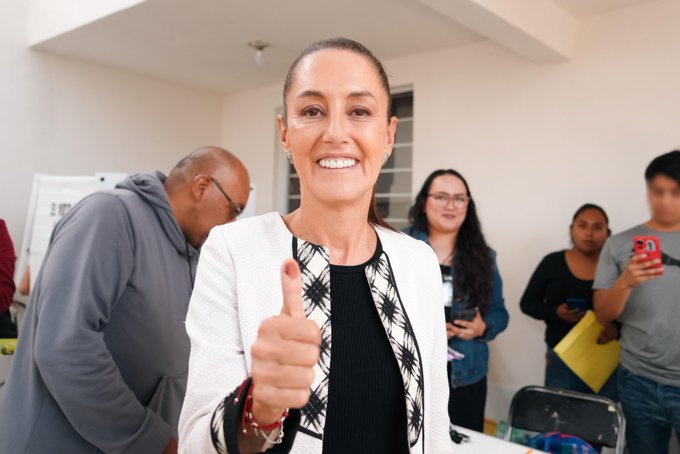Claudia Sheinbaum has made history by becoming Mexico’s first female president in a landslide victory.
According to Mexico’s official electoral authority, preliminary results indicate that the 61-year-old former mayor of Mexico City secured between 58% and 60% of the vote in Sunday’s election.
This gives her a lead of more than 30 percentage points over her main rival, businesswoman Xóchitl Gálvez.
Ms. Sheinbaum will succeed her mentor, outgoing President Andrés Manuel López Obrador, on October 1.
Ms Sheinbaum, a former energy scientist, has promised continuity, saying that she will continue to build on the “advances” made by Mr López Obrador.
In her victory speech, she told voters: “I won’t fail you.”
Her supporters are celebrating in the Zócalo, Mexico City’s main square, waving banners that read “Claudia Sheinbaum, president.”
Before running for president, Ms. Sheinbaum served as the mayor of Mexico City, a highly influential political position often seen as a stepping stone to the presidency.
Hemos hecho posible la continuidad y el avance de la Cuarta Transformación. Me comprometo con ustedes a que no les voy a fallar. ¡Hay historia, hay patria, hay pueblo y hay compromiso!https://t.co/e1sxxkVfzV
— Dra. Claudia Sheinbaum (@Claudiashein) June 3, 2024
Ms. Sheinbaum, whose maternal grandparents fled the Nazis in Bulgaria and immigrated to Mexico, had a distinguished career as a scientist before entering politics. Her paternal grandparents were from Lithuania.
Both of her parents were scientists, and Ms. Sheinbaum studied physics before earning a doctorate in energy engineering.
She spent years at a renowned research lab in California studying Mexican energy consumption patterns and became an expert on climate change.
This expertise and her student activism eventually led her to become the secretary of the environment for Mexico City when Andrés Manuel López Obrador was mayor.
In 2018, she became the first female mayor of Mexico City, a position she held until 2023, when she stepped down to run for president.
The election, which saw Ms. Sheinbaum face off against Ms. Gálvez, has been described as a transformative moment for women in Mexico.
Edelmira Montiel, 87, expressed her gratitude for living to see a woman elected to the highest office.
“Before we couldn’t even vote, and when you could, it was to vote for the person your husband told you to vote for. Thank God that has changed and I get to live it,” she told Reuters news agency, referring to the fact that women were only allowed to vote in national elections in 1953.
While the fact that both front-runners were women was widely celebrated, the campaign was marred by violent attacks.
In addition to electing a new president, voters also chose all members of Mexico’s Congress, governors in eight states, the head of Mexico City’s government, and thousands of local officials.
Local candidates were particularly targeted in the lead-up to the vote. The government reports that more than 20 were killed across Mexico, although other surveys put the total at 37.
Xóchitl Gálvez, Ms. Sheinbaum’s rival, sharply criticized the government and her opponent for the violence affecting large parts of Mexico. She promised to be “the bravest president, a president who confronts crime” if elected, but provided few details on how she would tackle the powerful criminal cartels behind much of the violence.
Mr. López Obrador, who has been in power since 2018, was barred from running for a second term under Mexico’s constitution, which limits presidents to a single six-year term.
Ms. Sheinbaum’s campaign received a significant boost from the popular president’s endorsement, as Mr. López Obrador has an approval rating of close to 60%.
Many of Ms. Sheinbaum’s supporters cited their backing of Morena’s program to alleviate poverty as a key reason for their vote, wanting to see these efforts continue.
The party highlights how millions of Mexicans have been lifted out of poverty over the past six years.
Economists note that other factors, such as increased remittances sent by Mexicans living abroad, have also contributed, but voters appear to support what they see as a successful strategy.



